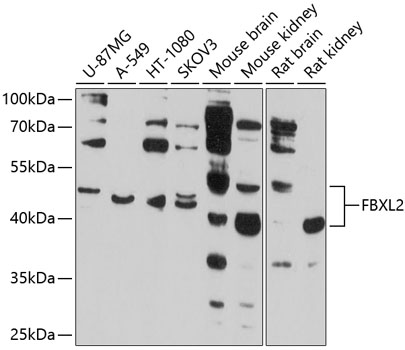-
Product Name
FBXL2 Polyclonal Antibody
- Documents
-
Description
Polyclonal antibody to FBXL2
-
Tested applications
WB
-
Species reactivity
Human, Mouse, Rat
-
Alternative names
FBXL2 antibody; FBL2 antibody; FBL3 antibody; F-box/LRR-repeat protein 2 antibody
-
Isotype
Rabbit IgG
-
Preparation
Antigen: Recombinant fusion protein containing a sequence corresponding to amino acids 120-240 of human FBXL2 (NP_036289.3).
-
Clonality
Polyclonal
-
Formulation
PBS with 0.02% sodium azide, 50% glycerol, pH7.3.
-
Storage instructions
Store at -20℃. Avoid freeze / thaw cycles.
-
Applications
WB 1:500 - 1:2000
-
Validations

Western blot - FBXL2 Polyclonal Antibody
Western blot analysis of extracts of various cell lines, using FBXL2 antibody at 1:1000 dilution.Secondary antibody: HRP Goat Anti-Rabbit IgG (H+L) at 1:10000 dilution.Lysates/proteins: 25ug per lane.Blocking buffer: 3% nonfat dry milk in TBST.Detection: ECL Basic Kit .Exposure time: 30s.
-
Background
Calcium-activated substrate recognition component of the SCF (SKP1-cullin-F-box protein) E3 ubiquitin-protein ligase complex, SCF(FBXL2), which mediates the ubiquitination and subsequent proteasomal degradation of target proteins. Unlike many F-box proteins, FBXL2 does not seem to target phosphodegron within its substrates but rather calmodulin-binding motifs and is thereby antagonized by calmodulin. This is the case for the cyclins CCND2 and CCND3 which polyubiquitination and subsequent degradation are inhibited by calmodulin. Through CCND2 and CCND3 degradation induces cell-cycle arrest in G(0). SCF(FBXL2) also mediates PIK3R2 ubiquitination and proteasomal degradation thereby regulating phosphatidylinositol 3-kinase signaling and autophagy. PCYT1A monoubiquitination by SCF(FBXL2) and subsequent degradation regulates synthesis of phosphatidylcholine, which is utilized for formation of membranes and of pulmonary surfactant (By similarity).
Related Products / Services
Please note: All products are "FOR RESEARCH USE ONLY AND ARE NOT INTENDED FOR DIAGNOSTIC OR THERAPEUTIC USE"
